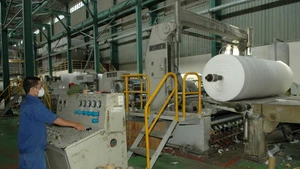This ranking reflects Vietnam’s commitment and efforts to build an economy based on knowledge, technology and innovation.
Continuous improvement
Since 2017, when a government resolution on the key tasks and solutions to improve the business environment and enhance national competitiveness was issued, Vietnam’s GII ranking has continuously improved.
According to the latest GII report, Vietnam ranked 44 out of 133 economies, up two places compared to 2023. Among the low-middle-income countries, Vietnam continues to maintain its second position. In Southeast Asia, Vietnam ranks 4th after Singapore, Malaysia and Thailand.
According to Associate Professor Tran Ngoc Ca, an innovation expert, the fact that Vietnam has been a leader in innovation among countries with the same economic level for many consecutive years demonstrates the stability and effectiveness of policies on science, technology and innovation, as well as the attention devoted to the application of science and technology in various fields in recent years.
The GII will positively impact foreign investment in Vietnam, especially in attracting technology-related businesses. This ranking affirms Vietnam’s position in the context of international integration.
With this year’s results, the WIPO states that Vietnam is one of the eight middle-income countries that have climbed the most in the GII rankings since 2013 (including China, Turkey, India, Vietnam, the Philippines, Indonesia, Iran and Morocco). For 14 consecutive years, Vietnam has always had higher innovation results than its level of development.
This shows the effectiveness of converting input resources into innovation outputs. Vietnam scores above its income level in all GII pillars and even above the upper-middle-income group, except for human capital and research.
The GII is measured on seven major pillars, with about 70-80 component indicators.
This year, Vietnam ranks first globally in high-tech exports, high-tech imports and creative goods exports. Vietnam’s creative goods exports index has reached the top position for the first time, compared to 7th in 2023. This index is the output of innovation.
Notably, the venture capital index tends to grow very well, with the number of venture capital deals up by 27 places, ranking 50/133 countries, and the number of deals receiving venture capital up by ten places, to position 44/133 countries.
According to Pham Hong Quat, Director of the Department of Market Development for Science and Technology Enterprises under the Ministry of Science and Technology, the venture capital index plays an important role in the GII because it reflects the ability to provide capital and the level of financial support for the innovation startup ecosystem.
This success is the result of the government and Prime Minister’s bold leadership, as well as the participation of ministries, sectors, localities and the science, technology and innovation community.
Along with that are policies to develop green economic models and the circular economy, develop technology-based enterprises (spin-offs) from institutes and schools, promote investment in green technology artificial intelligence, develop innovation startup support centres, promote technology incubation activities, and organise various innovation startup events.
Enterprises have been active and proactive in the research and application of science and technology in production and business activities and in promoting innovation in enterprises.
Three groups of measures for further improvement
The 2024 GII report shows that Vietnam has not improved in two pillars: institutions and human capital and research.
Minister of Science and Technology Huynh Thanh Dat said institutional issues still need further improvement to facilitate socio-economic development based on science, technology and innovation, especially the regulatory quality, which ranks 95/133 countries.
Under human capital and research, the education indexes group hasn’t improved much. It is necessary to continue improving the quality of training to attract domestic and foreign students. The education model needs further investment to meet international standards. It is necessary to promote the role of universities in cooperating with businesses to carry out research, development and innovation.
In addition, it is necessary to pay attention to the index ICT infrastructure because no significant change has been made when it ranks 72/133 countries, failing to meet the government’s goal of improving this index.
The 2024 GII Report also pointed out that Vietnam lacks data in three indexes while data for 12 indexes are outdated. This situation affects the aggregate score, which, in turn, affects the overall innovation index.
According to an innovation expert, the GII data are calculated from secondary data, which are results that have been collected and analysed directly or have been calculated and synthesised by international organisations, with about 30 data sources used. Therefore, ministries and agencies must update their data for objective and accurate assessment.
Under the national strategy for science, technology and innovation development, Vietnam aims to improve its innovation ranking continuously and make it to the top 40 countries in the world by 2030.
To maintain and continue improving the GII ranking sustainably, Minister of Science and Technology Huynh Thanh Dat said that Vietnam needs to continue focusing on both input and output factors of innovation, with special attention paid to improving index groups with much room and potential for development.
Accordingly, three groups of solutions need to be implemented immediately to improve the index next year.
Firstly, it is necessary to build outstanding and specific mechanisms and policies to facilitate the development of science, technology and innovation so that science, technology and innovation are truly the main driving force of economic growth while promoting the development of the digital economy and digital society.
Secondly, to proactively acquire the world’s advanced technologies, it is necessary to improve the capacity of enterprises, prioritise environmentally friendly projects, connect domestic and foreign enterprises to participate in the global value chain, and continue to develop the innovation startup ecosystem.
Finally, ministries and agencies must determine and implement fundamental, synchronous and long-term solutions to improve the indexes with low rankings for many consecutive years. In the meantime, localities must actively implement solutions to improve the local innovation index, thereby contributing to improving the global innovation index.
















